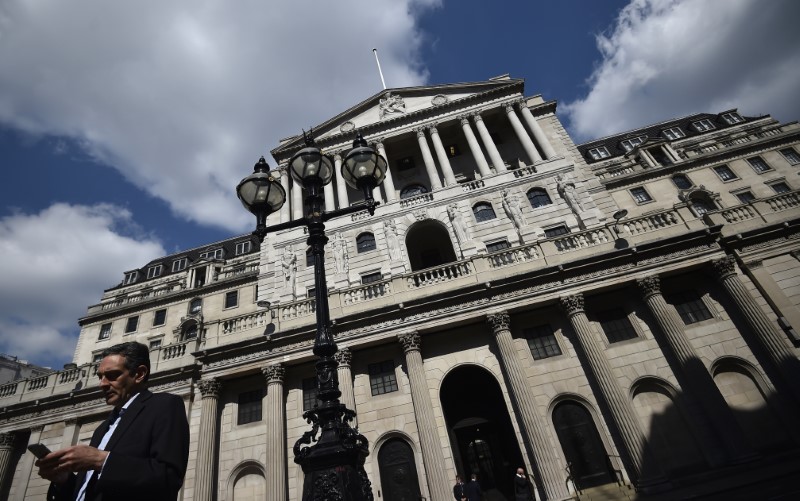By William Schomberg
LONDON (Reuters) - The Bank of England moved closer to ending its decade-long emergency support for Britain's economy on Wednesday when its chief economist, Andy Haldane, said he was likely to vote for an interest rate hike this year.
The surprisingly hawkish tone of Haldane in a speech added new uncertainty about monetary policy at a time when Prime Minister Theresa May is struggling to form a stable government and as Britain begins its Brexit negotiations with Brussels.
Sterling - which plunged after the Brexit vote last year as investors bet there was little chance of the BoE following the lead of the U.S. Federal Reserve and raising rates - gained about a cent against the U.S. dollar.
British share and government bond prices fell. [GBP/]
The comments from Haldane came a day after BoE Governor Mark Carney sought to dampen the prospect of a hike, saying he wanted to see how the economy copes in the coming months as Britain starts the process of leaving the European Union.
Investors have been on edge about the possibility of a policy shift in the world's fifth-biggest economy since last week when the BoE's policymakers voted by a narrower-than-expected margin of 5-3 to keep rates on hold at a record low.
All three of the votes in favour of higher rates were cast by external rate-setters. Haldane's comments on Wednesday represented the first sign of a shift in thinking among the internal members of the Monetary Policy Committee.
Until now, he has been seen as largely supportive of keeping rates low.
Haldane said in a speech published on Wednesday that he voted to keep rates on hold last week because he had not seen signs of a pickup in wage growth and there was "still some chance" of a sharper-than-expected slowdown in the economy.
But he signalled that he was likely to switch position soon, given the strength of the global economy and the resilience of Britain's economy to last year's Brexit vote.
"Provided the data are still on track, I do think that beginning the process of withdrawing some of the incremental stimulus provided last August would be prudent moving into the second half of the year," he said in a speech.
"The first 25 basis-point rise in UK interest rates for 10 years seems like a momentous step. But it would still leave monetary policy highly accommodative by any historical metric."
Investors are now trying to work out the likely thinking of other members of the Bank's Monetary Policy Committee, a job which has been complicated by the departure of two of its members, only one of whom has so far been replaced.
Sam Hill, an economist with RBC Capital, said he would be checking the central bank's weekly calendar - which is usually published on Friday afternoons - to see if Ben Broadbent, the BoE's deputy governor for monetary policy whose views have largely aligned with Carney's, was due to speak soon.
"I think it's really important to see what Broadbent thinks. That will really shape expectations," Hill said.
The BoE's next policy announcement is due on Aug. 3. It is not clear if the one vacant seat on the usually nine-member Monetary Policy Committee will be filled by then.
One of the three MPC members who backed a rate hike last week, Kristin Forbes, will leave the BoE this month and it is not clear how her successor Silvana Tenreyro is likely to vote.
The BoE has given signals before that it was getting ready to raise rates only for its plans to be knocked off course. In 2015, Carney said a hike was likely - shortly before a plunge in global oil prices that took inflation to zero.
DUST CLOUD OF UNCERTAINTY
In August last year the BoE cut interest rates to 0.25 percent and took other measures to give the economy a boost after signs of a sharp slowdown caused by the referendum decision in June to leave the European Union.
In the end, Britain's economy withstood the referendum shock better than expected in 2016, although it has shown signs of a slowdown since the start of this year as the fall in the value of the pound pushes up inflation and pinches consumer spending.
Haldane listed several factors behind his shifting view. These included a recent jump in the country's main inflation rate to 2.9 percent - far above the BoE's 2 percent target - and signs in the bond market that "policy actions rather than words" were what counted for investors.
He also said Britain's economy appeared a bit less reliant on consumers whose spending has been pinched by inflation.
The BoE said earlier on Wednesday that business investment plans were strengthening and sterling weakness was boosting export volumes.
However, Haldane said he wanted to wait for a clearing of the "dust-cloud of uncertainty" that was thrown up by the inconclusive outcome of Britain's election.

"It is unclear what twists and turns lie ahead, with potentially important implications for asset prices and, at least potentially, confidence among businesses and consumers," he said.